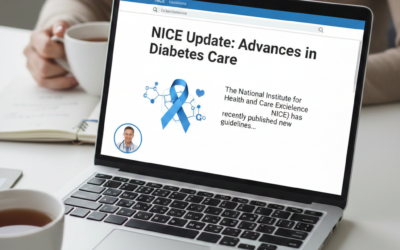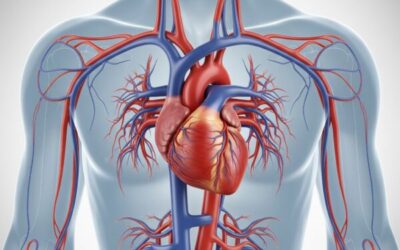The National Institute for Health and Care Excellence (NICE) has released a major update to NG28, the guideline for the management of type 2 diabetes in adults. This is the most significant shift in prescribing strategy since the original guideline was introduced. The...
News and Articles
COPD Case Study: Acute Exacerbation Management for Healthcare Professionals
If you found this article useful, don’t miss our upcoming CliniLink Respiratory Clinical Excellence Update a live CPD-accredited event where experts will cover the latest COPD and asthma guidelines, FeNO in diagnosis, greener inhaler pathways, and practical...
Case Study: Diagnosing Heart Failure in Primary Care
Heart failure is not always obvious. A subtle rise in NT-proBNP or a patient who “just feels tired” can easily be misattributed to age or comorbidity.This short case highlights how structured interpretation of investigations — aligned with NICE NG106 (2024) and the...
A Complete Guide to AIR and MART Therapy for Asthma Control
Experience a new era in asthma care with our innovative combination inhalers that simplify treatment and enhance control. Learn more about asthma management at the NICE Guidelines.Combines prevention and relief in one inhaler, reducing the need for multiple...
Menopause CPD 2025: Event Highlights and Learning Outcomes for Prescribers
You know menopause can feel like a complex puzzle with missing pieces. On 27th September, over 100 delegates gathered to uncover valuable insights at our Menopause event with Dr Manju Navani and Dr Almas Agha. The focus was clear: equip you with a menopause toolkit to...
Expert Insights: Enhancing CVD Management in Primary Care Event
Imagine transforming your approach to CVD management with insights from two leading experts. At our 6th September event, Dr Aseem Mishra and Prof Ahmet Fuat delved into hypertension, chronic kidney disease, heart failure, and lipid management. The day wasn't just...
Deep Dive: Diabetes Management in Primary Care – CPD Event Recap
On Saturday 12th July 2025, CliniLink proudly hosted a face-to-face CPD-accredited event titled “Deep Dive: Diabetes Management in Primary Care,” and what a fantastic day it was! Held at the beautiful Royal Nawaab Pyramid venue in Stockport, the session welcomed over...
Amiloride vs Spironolactone in Resistant Hypertension: A Promising Alternative or Just Non-Inferior?
Resistant hypertension remains a persistent challenge in primary care and specialist settings alike. Despite guideline-directed therapy with ACE inhibitors or ARBs, calcium channel blockers, and thiazide-like diuretics, many patients continue to have suboptimal blood...
QR4: A Smarter Way to Predict Cardiovascular Risk
Cardiovascular disease (CVD) continues to be the leading cause of death in the UK and globally, despite decades of public health advances and improvements in treatment. As clinicians, our ability to accurately assess risk is central to preventing serious...
NICE AI Skin Cancer Guidance: What GPs Need to Know About New Referral Tools
The integration of artificial intelligence (AI) into primary care is no longer a futuristic concept—it’s here. With the recent NICE early value assessment (HTE24) guidance focusing on AI for assessing and triaging suspicious skin lesions, GPs are now at the forefront...
National Heart Week: Five Simple Lifestyle Tips for a Healthier Heart
National Heart Week (April 29 – May 5) is a perfect time for healthcare professionals to encourage simple lifestyle changes that make a big impact on heart health. Whether you’re a GP, nurse, pharmacist, or allied health professional, your brief advice can empower...
NICE Approval: A New Option for Endometriosis
Ryeqo for Endometriosis: A New Treatment, A Renewed Responsibility With NICE's recent approval of Ryeqo (relugolix, estradiol, norethisterone acetate) for use on the NHS, women of reproductive age now have a new treatment option for endometriosis. But this advancement...
BMS Update: How to Safely Use HRT with Incretins
In April 2025, the British Menopause Society (BMS) published new clinical guidance to support healthcare professionals managing women who are prescribed both incretin-based therapies and hormone replacement therapy (HRT). This comes at a crucial time, as GLP-1...
Asthma Reimagined: Understanding the 2024 NICE Guidelines for Primary Care
The 2024 NICE asthma guideline update marks a transformative step in asthma care, especially within primary care settings. With an emphasis on objective diagnosis, safer prescribing, and sustainability, this new guidance aims to improve outcomes and reduce variation...
Primary Care Pharmacist Jobs in the UK: Busting Myths, Exploring Opportunities, and Taking the Next Step
The landscape of primary care in the UK is evolving, presenting numerous opportunities for pharmacists to play a pivotal role. However, misconceptions and uncertainties often deter many from exploring these roles. At CliniLink, we've engaged with pharmacists across...
Melatonin for Perimenopause and Menopause: Does It Improve Sleep Quality?
Melatonin for Perimenopause and Menopause: Does It Improve Sleep Quality? Many women experience disrupted sleep during perimenopause and menopause, often due to hormonal changes that affect the body's natural circadian rhythm. As melatonin—the sleep hormone—declines...
Understanding the Changing Economics of NHS Drug Pricing: An Essential Guide for UK Clinical Pharmacists
Recent headlines reveal growing concerns among major pharmaceutical companies regarding the NHS rebate system. Companies such as AstraZeneca, GSK, and Pfizer have warned that high repayment rates,reported to reach up to 22.9% for newer medicines, are placing...
Mental Health First Aid & Self-Care: Strategies for Better Wellbeing
Mental Health and Wellbeing: Essential Strategies for a Healthier Mind Mental health is just as important as physical health, yet many people overlook it in their daily lives. With increasing stress levels, digital overload, and workplace pressures, taking proactive...
Understanding the Adequate Dose of Progestogens in HRT
Hormone Replacement Therapy (HRT) is a widely used treatment for managing menopausal symptoms and protecting long-term health. For women with an intact uterus, combining oestrogen therapy with a progestogen is essential to prevent endometrial hyperplasia and reduce...
How AI is Transforming Pharmacy – From Drug Discovery to Patient Care
The Future of Pharmacy is Digital – Here’s What You Need to Know Artificial Intelligence (AI) is revolutionising the pharmaceutical industry, from drug discovery to patient care. Pharmacists and healthcare professionals are increasingly using AI-powered tools to...
CVD Risk, Insomnia, and the Role of Daridorexant: What You Need to Know
Introduction: What I Learned About Insomnia and Cardiovascular Risk Recently, I attended a fascinating talk by Dr Yassir Javed, sponsored by Idorsia, where he discussed the link between insomnia and cardiovascular disease (CVD). As someone deeply interested in...





















